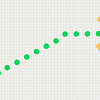Innovation key to avoiding middle-income trap

Bangladesh needs to invest in innovation, technology and productivity in order to avoid the middle-income trap, said economists yesterday.
They said many countries managed to attain the middle-income status but they could not advance further and become developed nations as they did not take proper policies on time.
On the other hand, some middle-income nations emerged as developed countries within a short time on the back of prudent policies and measures. South Korea is one of them.
In 1995, Korea crossed the World Bank's gross national income per capita threshold for high-income economies. Its per capita income surged to $34,998 and became the 10th largest economy in the world in 2021.
Some middle-income nations emerged as developed countries within a short time on the back of prudent policies and measures. South Korea is one of them.
"Korea's growth benefited from contributions from both investment and productivity improvement," said Hoon Sahib Soh, practice manager for macroeconomics, trade and investment and public sector at the WB.
He spoke at a seminar on "avoiding a middle-income trap in Bangladesh: lessons from Korea" at the Renaissance Hotel in Dhaka.
After the Asian Financial Crisis, Korea transitioned to a more productivity-led growth from input-led growth, he said in a keynote paper.
By 2000, Korea's manufacturing sector's labour productivity reached 75 percent and the country accelerated global value chain integration in the mid-1990s through the expansion of outward direct investments and became a major exporter of key intermediate goods and high-technology products.
Also, the Korean government launched a major tariff rate reduction programme in the 1980s and the simple average tariff rate of all products was reduced from 23.7 percent in 1983 to 8 percent in 1994.
Since the mid-1990s, important liberalisation was pursued through more than 50 free trade agreements, the economist said.
Korea topped the 2021 Global Survey of Digital and Sustainable Trade Facilitation and came 17th out of 139 nations in the 2023 Logistics Performance Index.
Producing skilled workforce, investment in technologies and digital adoption, financial sector reforms, capital market liberalisation, and policy shift from promoting large to small firms were behind the success of Korea, according to Soh.
"Sustainable investment in human capital, investments in infrastructure, effective bureaucracy, macroeconomic stability, manufacturing export through industrial policies, and private sector-led growth laid the foundations for Korea's growth."
He said the transition to a more market-led economy, sustainable promotion of private enterprises, adoption of technologies, investment in human capital development and building support for reforms through social consensus are lessons from Korea for developing countries.
Soh listed a number of challenges facing the developing nations, including low productivity growth, the persistent productivity gap between large and small firms, aging, declining population, a low fertility rate, and a higher gender gap.
Fahmida Khatun, executive director of the Centre for Policy Dialogue, a private think tank, identifies higher tariffs and the poor quality of education as major challenges for Bangladesh.
"For a healthy financial sector, the country needs to invest in innovation, technologies and productivity."
Md Fazlul Hoque, managing director of Nayaranganj-based Plummy Fashions, said the investment is not fully utilised.
He said many students are not interested in studying at vocational training institutes because of poor standards.
"On the other hand, export diversification is not happening and productivity is one of the lowest in Bangladesh."
The business leader called for improving productivity by 25 percent from the current level.
Zaidi Sattar, chairman and chief executive of the Policy Research Institute of Bangladesh, said incentives should be equal for all sectors and the higher tariff regime should be liberalised.
Park Young Sik, ambassador of Korea to Bangladesh, talked about the pension scheme for older people that was introduced in his country in 1988.
State Minister for Planning Shamsul Alam said the best way to break syndicates in the market is to allow imports. So, the government has allowed the import of eggs.

 For all latest news, follow The Daily Star's Google News channel.
For all latest news, follow The Daily Star's Google News channel. 





Comments